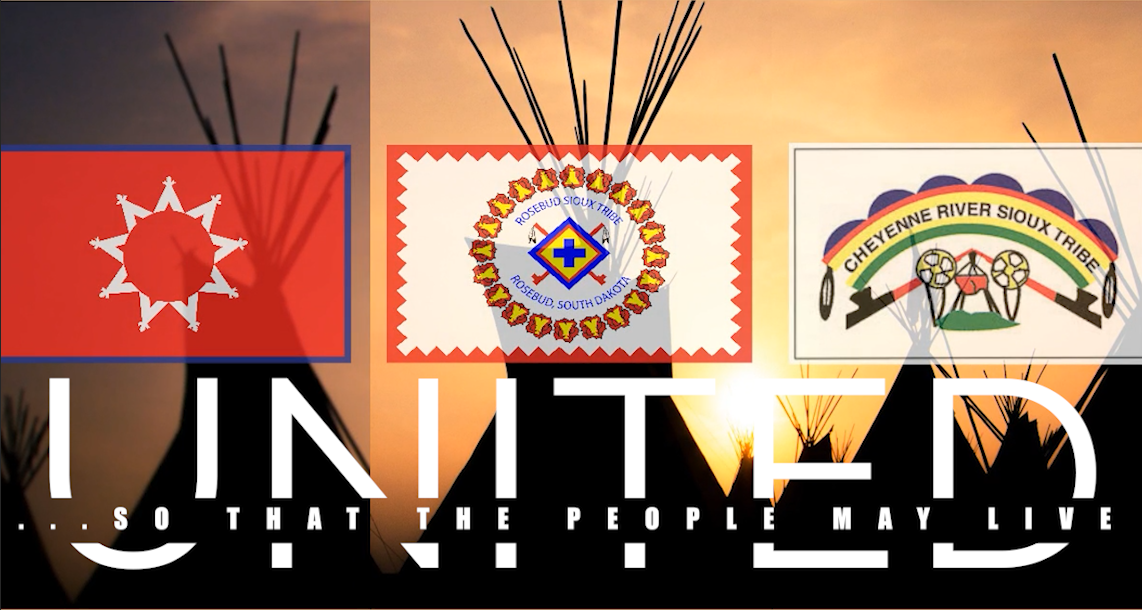
Historic Allies Realign to Improve Healthcare
Source: Great Plains Tribal Leaders’ Health Board (gptchb.org)
RAPID CITY – Three of the country’s largest tribal-nations have formed a historic alliance to improve healthcare for tribal-citizens living in Pennington County, South Dakota.
On Wednesday, November 4, the Rosebud Sioux Tribe passed resolution 2021-266, bringing the tribe into the current partnership between the Oglala Sioux Tribe and the Cheyenne River Sioux Tribe, to assume providing health care for eligible patients who live in Pennington County. The three tribes are able to contract to provide services under the Indian Self-Determination Act from the federal government at the Rapid City Service Unit (formerly Sioux San Health Care Facility). The Native American Self Determination Act is federal mechanism that allows tribal-nations to take control of government institutions intended to provide services to tribal-citizens.
“We welcome Rosebud back to the circle and hope that we can all work together to address our relatives’ health care needs in Rapid City,” said Oglala Sioux Councilman Ryan Jumping Eagle, Chair of OST’s Health and Human Services Committee.
For the last two years, the Great Plains Tribal Leaders’ Health Board has operated the Oyate Health Center in Rapid City, SD on behalf of the Oglala and Cheyenne River Sioux Tribes under a contract with the US Indian Health Service.
“With Rosebud joining us we can create a healthcare system that will meet the needs of all our relatives living in Rapid City. We commend the Rosebud Sioux Tribe for joining us as allies in this fight to improve healthcare for our people,” said Cheyenne River Sioux Tribal Councilman Ryman Lebeau, Chair of CRST’s Health Committee.
The addition of the Rosebud Sioux Tribe into this united health care partnership clears the way for a dramatic expansion of healthcare services for tribal-members living in Pennington County.
“Good and competent health care is a treaty right,” said President Scott Herman of the Rosebud Sioux Tribe. “On the whole, Indian Health Service has not lived up to that treaty obligation. We are confident that this move will enable our people the opportunity to get all of their health care in one location while preventing IHS from wasting funds on duplicating services. We expect that this partnership will pay dividends and expand services that our currently in short supply for the people of the Rosebud Sioux Tribe.”
This action now authorizes the Oyate Health Center to assume responsibility for all services for IHS eligible beneficiaries in Pennington County previously provided by the Indian Health Service on the Sioux San Campus. The implications of the Rosebud Sioux Tribe’s decision to join their sister-tribes in the historic partnership means the new Oyate Health Center, a $120 million facility that is now under construction, will no longer be divided into separate clinics, nor will it be controlled by the federal government.
Great Plains Tribal Leaders’ Health Board CEO Jerilyn Church says that current IHS employees who are stationed on the Sioux San Campus, will be offered the opportunity to join the organization.
“Our OHC community will grow yet again. We extended an invitation to IHS employees in July of 2019 to join us, and we will again. Now that all of the tribes are united, we will work hard to continue to improve healthcare for our relatives who use the Oyate Health Center,” said Church.
The Oyate Health Center hosted 95,000+ patient visits and generated revenue of $10 million last fiscal year with 100% of it reinvested into services for patients. The Oyate Health Center purchased an entirely separate behavioral health location and expanded providers for the facility from 3-17 as part of that reinvestment.
*The Great Plains Tribal Leaders’ Health Board is established to provide the tribal nations in the Great Plains region with a formal representative Board as a means of communicating and participating with the Great Plains Area Indian Health Service and other Health and Human Services entities and organizations on health matters.
Tuba City Regional Health Care Corporation (Navajo Nation)
HHS Small Ambulatory Program Awards $55 Million to 15 Tribes and Tribal Organizations (Indian Health Service)
Indian Health Service Announces New Deputy Director for Quality Health Care and Enterprise Risk Management (Indian Health Service)
Federal Emergency Management Agency (FEMA)
White House Office of Management and Budget (Joe Biden Administration)
Tuba City Regional Health Care Corporation (Arizona, Navajo Nation)
Oklahoma City Indian Clinic (OKCIC)
Indian Health Service (Department of Health and Human Services)
Navajo Nation Town Hall (Arizona, New Mexico, Utah)
Navajo Nation (Arizona, New Mexico, Utah)
Tribal organizations statement on advance appropriations for Indian Health Service
Indian Health Service Statement on Advance Appropriations (Department of Health and Human Services)
Indian Health Service (Department of Health and Human Services)
Indian Health Service (Department of Health and Human Services)
